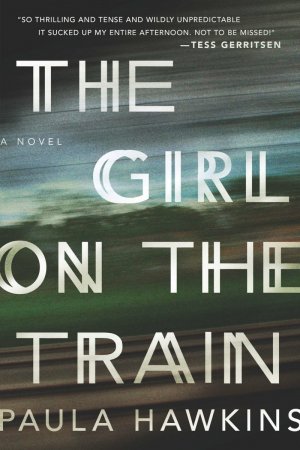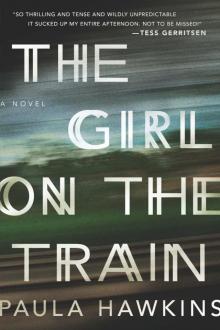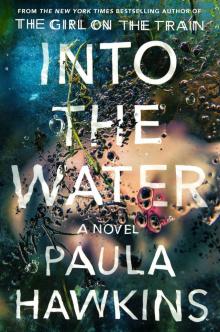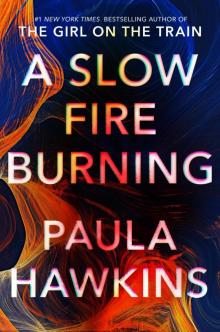- Home
- Paula Hawkins
The Girl on the Train Page 28
The Girl on the Train Read online
Page 28
When we started all this, it was just a game. A distraction. I used to see him from time to time. He’d pop by the gallery and smile and flirt, and it was harmless—there were plenty of men who came by the gallery and smiled and flirted. But then the gallery closed and I was here at home all the time, bored and restless. I just needed something else, something different. Then one day, when Scott was away, I bumped into him in the street, we started talking and I invited him in for coffee. The way he looked at me, I could see exactly what was going through his mind, and so it just happened. And then it happened again, and I never meant for it to go anywhere, I didn’t want it to go anywhere. I just enjoyed feeling wanted; I liked the feeling of control. It was as simple and stupid as that. I didn’t want him to leave his wife; I just wanted him to want to leave her. To want me that much.
I don’t remember when I started believing that it could be more, that we should be more, that we were right for each other. But the moment I did, I could feel him start to pull away. He stopped texting, stopped answering my calls, and I’ve never felt rejection like that before, never. I hated it. So then it became something else: an obsession. I can see that now. In the end I really thought I could just walk away from it, a little bruised, but no real harm done. But it’s not that simple any longer.
Scott is still outside the door. I can’t hear him, but I can feel him. I go into the bathroom and dial the number again. I get voice mail again, so I hang up and dial again, and again. I whisper a message. “Pick up the phone, or I’m coming round there. I mean it this time. I have to talk to you. You can’t just ignore me.”
I stand in the bathroom for a while, the phone on the edge of the sink. Willing it to ring. The screen stays stubbornly grey and blank. I brush my hair and my teeth, put on some makeup. My colour is returning to normal. My eyes are still red, my throat still hurts, but I look all right. I start counting. If the phone doesn’t ring before I get to fifty, I’m just going to go down there and knock on the door. The phone doesn’t ring.
I stuff the phone into my jeans pocket, walk quickly through the bedroom and open the door. Scott is sitting on the landing, his arms around his knees, his head down. He doesn’t look up at me, so I walk past him and start to run downstairs, my breath catching in my throat. I’m afraid that he’ll grab me from behind and push me. I can hear him getting to his feet, and he calls, “Megan! Where are you going? Are you going to him?”
At the bottom of the stairs, I turn. “There is no him, OK? It’s over.”
“Please wait, Megan. Please don’t go.”
I don’t want to hear him beg, don’t want to listen to the whine in his voice, the self-pity. Not when my throat still feels like someone’s poured acid down it.
“Don’t follow me,” I croak at him. “If you follow me, I’ll never come back. Do you understand? If I turn around and see you behind me, that’ll be the last time you ever see my face.”
I can hear him calling my name as I slam the door behind me.
I wait on the pavement outside for a few moments to make sure he isn’t following me, then I walk, quickly at first, then slower, and slower, along Blenheim Road. I get to number twenty-three and it’s then that I lose my nerve. I’m not ready for this scene yet. I need a minute to collect myself. A few minutes. I walk on, past the house, past the underpass, past the station. I keep going until I get to the park and then I dial his number one more time.
I tell him that I’m in the park, that I’ll wait for him there, but if he doesn’t come, that’s it, I’m going round to the house. This is his last chance.
It’s a lovely evening, a little after seven but still warm and light. A bunch of kids are still playing on the swings and the slide, their parents standing off to one side, chatting animatedly. It looks nice, normal, and as I watch them I have a sickening feeling that Scott and I will not bring our daughter here to play. I just can’t see us happy and relaxed like that. Not now. Not after what I’ve just done.
I was so convinced this morning that getting everything out in the open would be the best way—not just the best way, the only way. No more lying, no more hiding. And then when he hurt me, it only made me all the more sure. But now, sitting here on my own, with Scott not just furious but heartbroken, I don’t think it was the right thing at all. I wasn’t being strong, I was being reckless, and there’s no telling how much damage I’ve done.
Maybe the courage I need has nothing to do with telling the truth and everything to do with walking away. It’s not just restlessness—this is more than that. For her sake and mine, now is the time to go, to walk away from them both, from all of it. Maybe running and hiding is exactly what I need to do.
I get to my feet and walk round the park just once. I’m half willing the phone to ring and half dreading it ringing, but in the end I’m pleased when it stays silent. I’ll take it as a sign. I head back the way I came, towards home.
I’ve just passed the station when I see him. He’s walking quickly, striding out of the underpass, his shoulders hunched over and his fists clenched, and before I can stop myself, I call out.
He turns to face me. “Megan! What the hell . . .” The expression on his face is pure rage, but he beckons me to go to him.
“Come on,” he says, when I get closer. “We can’t talk here. The car’s over there.”
“I just need—”
“We can’t talk here!” he snaps. “Come on.” He tugs at my arm. Then, more gently, “We’ll drive somewhere quiet, OK? Somewhere we can talk.”
As I get into the car, I glance over my shoulder, back the way he came. The underpass is dark, but I feel as though I can see someone in there, in the shadows—someone watching us go.
RACHEL
• • •
SUNDAY, AUGUST 18, 2013
AFTERNOON
Anna turns on her heel and runs into the house the second she sees him. My heart hammering against my ribs, I follow cautiously, stopping just short of the sliding doors. Inside, they are embracing, his arms enveloping her, the child between them. Anna’s head is bent, her shoulders shaking. His mouth is pressed to the top of her scalp, but his eyes are on me.
“What’s going on here, then?” he asks, the trace of a smile on his lips. “I have to say that finding you two ladies gossiping in the garden when I got home was not what I expected.”
His tone is light, but he’s not fooling me. He’s not fooling me anymore. I open my mouth to speak, but I find that I don’t have the words. I have nowhere to start.
“Rachel? Are you going to tell me what’s going on?” He relinquishes Anna from his grasp and takes a step towards me. I take a step back, and he starts to laugh.
“What on earth’s wrong with you? Are you drunk?” he asks, but I can see in his eyes that he knows I’m sober and I’m betting that for once he wishes I wasn’t. I slip my hand into the back pocket of my jeans—my phone is there, hard and compact and comforting, only I wish I’d had the sense to make the call already. No matter whether they believed me or not, if I’d told them I was with Anna and her child, the police would have come.
Tom is now just a couple of feet away from me—he’s just inside the door and I’m just outside it.
“I saw you,” I say at last, and I feel euphoria, fleeting but unmistakable, when I say the words out loud. “You think I don’t remember anything, but I do. I saw you. After you hit me, you left me there, in the underpass . . .”
He starts to laugh, but I can see it now and I wonder how I never read him this easily before. There’s panic in his eyes. He shoots a glance at Anna, but she doesn’t meet his eye.
“What are you talking about?”
“In the underpass. On the day Megan Hipwell went missing . . .”
“Oh, bullshit,” he says, waving a hand at me. “I did not hit you. You fell.” He reaches for Anna’s hand and pulls her closer to him. “Darling, is this why you’re so u
pset? Don’t listen to her, she’s talking absolute rubbish. I didn’t hit her. I’ve never laid a hand on her in my life. Not like that.” He puts his arm around Anna’s shoulders and pulls her closer still. “Come on. I’ve told you how she is. She doesn’t know what happens when she drinks, she makes up the most—”
“You got into the car with her. I watched you go.” He’s still smiling, but there’s no longer any conviction there, and I don’t know whether I’m imagining it, but he looks a little paler to me now. He relaxes his grip on Anna, releasing her once again. She sits down at the table, her back to her husband, her daughter squirming on her lap.
Tom passes his hand over his mouth and leans back against the kitchen counter, folding his arms across his chest. “You saw me get into the car with who?”
“With Megan.”
“Oh, right!” He starts laughing again, a loud, forced roar. “Last time we talked about this, you told me you saw me get into the car with Anna. Now it’s Megan, is it? Who’s it going to be next week? Princess Diana?”
Anna looks up at me. I can see the doubt, the hope, flash across her face. “You’re not sure?” she asks.
Tom drops to his knees at her side. “Of course she isn’t sure. She’s making this up—she does it all the time. Sweetheart, please. Why don’t you go upstairs for a bit, OK? I’ll talk this through with Rachel. And this time”—he glances up at me—“I promise I’ll make sure she won’t bother us anymore.”
Anna’s wavering, I can see it—the way she’s looking at him, searching his face for the truth, his eyes intently on hers. “Anna!” I call out, trying to bring her back to me. “You know. You know he’s lying. You know that he was sleeping with her.”
For a second, no one says a thing. Anna looks from Tom to me and back again. She opens her mouth to say something, but no words come.
“Anna! What does she mean? There’s . . . there was nothing between me and Megan Hipwell.”
“I found the phone, Tom,” she says, her voice so small, she’s almost inaudible. “So please, don’t. Don’t lie. Just don’t lie to me.”
The child starts to grizzle and moan. Very gently, Tom takes her from Anna’s arms. He walks across to the window, rocking his daughter from side to side, murmuring to her all the while. I can’t hear what he’s saying. Anna’s head is bowed, tears dripping from her chin onto the kitchen table.
“Where is it?” Tom says, turning to face us, the laughter gone from his face. “The phone, Anna. Did you give it to her?” He jerks his head in my direction. “Do you have it?”
“I don’t know anything about a phone,” I tell him, wishing that Anna had mentioned this earlier.
Tom ignores me. “Anna? Did you give it to her?”
Anna shakes her head.
“Where is it?”
“I threw it away,” she says. “Over the fence. By the track.”
“Good girl. Good girl,” he says distractedly. He’s trying to figure things out, work out where to go from here. He glances at me and then looks away. For just a moment, he looks beaten.
He turns to Anna. “You were so tired all the time,” he says. “You just weren’t interested. Everything was about the baby. Isn’t that right? It was all about you, wasn’t it? All about you!” And just like that, he’s on top again, perked up, pulling faces at his daughter, tickling her tummy, making her smile. “And Megan was so . . . well, she was available.
“At first, it was over at her place,” he says. “But she was so paranoid about Scott finding out. So we started meeting at the Swan. It was . . . Well, you remember what it was like, don’t you, Anna? At the beginning, when we used to go to that house on Cranham Road. You understand.” He glances back over his shoulder at me and winks. “That’s where Anna and I used to meet, back in the good old days.”
He shifts his daughter from one arm to the other, allowing her to rest against his shoulder. “You think I’m being cruel, but I’m not. I’m telling the truth. That’s what you want, isn’t it, Anna? You asked me not to lie.”
Anna doesn’t look up. Her hands are gripping the edge of the table, her entire body rigid.
Tom gives a loud sigh. “It’s a relief, if I’m honest.” He’s talking to me, looking at me directly. “You have no idea how exhausting it is, coping with people like you. And, fuck, I tried. I tried so hard to help you. To help both of you. You’re both . . . I mean, I loved you both, I really did, but you can both be incredibly weak.”
“Fuck you, Tom,” Anna says, getting up from the table. “Don’t you lump me in with her.”
I look at her and realize how well suited they are, Anna and Tom. She’s a much better match than I am, because this is what bothers her: not that her husband is a liar and a killer, but that he’s just compared her to me.
Tom goes to her side and says soothingly, “I’m sorry, darling. That was unfair of me.” She brushes him away and he looks over at me. “I did my best, you know. I was a good husband to you, Rach. I put up with a lot—your drinking and your depression. I put up with all that for a long time before I threw in the towel.”
“You lied to me,” I say. “You told me everything was my fault. You made me believe that I was worthless. You watched me suffer, you—”
He shrugs. “Do you have any idea how boring you became, Rachel? How ugly? Too sad to get out of bed in the morning, too tired to take a shower or wash your fucking hair? Jesus. It’s no wonder I lost patience, is it? It’s no wonder I had to look for ways to amuse myself. You’ve no one to blame but yourself.”
His expression changes from contempt to concern as he turns to talk to his wife. “Anna, it was different with you, I swear. That thing with Megan, it was just . . . just a bit of fun. That’s what it was meant to be. I’ll admit it wasn’t my finest hour, but I just needed a release. That’s all. It was never going to last. It was never going to interfere with us, with our family. You must understand that.”
“You . . .” Anna is trying to say something, but she can’t get the words out.
Tom puts his hand on her shoulder and squeezes it. “What, love?”
“You had her looking after Evie,” she spits. “Were you screwing her while she was working here? While she was looking after our child?”
He removes his hand, his face a picture of contrition, of deep shame. “That was terrible. I thought . . . I thought it would be . . . Honestly, I don’t know what I thought. I’m not sure I was thinking at all. It was wrong. It was terribly wrong of me.” And the mask changes again—now he’s wide-eyed innocence, pleading with her: “I didn’t know then, Anna. You have to believe that I didn’t know what she was. I didn’t know about the baby she killed. I would never have let her look after Evie if I’d known that. You have to believe me.”
Without warning, Anna jumps to her feet, pushing her chair back—it clatters onto the kitchen floor, startling their daughter. “Give her to me,” Anna says, holding her arms out. Tom backs away a little. “Now, Tom, give her to me. Give her to me.”
But he doesn’t, he walks away from her, rocking the child, whispering to her again, coaxing her back to sleep, and then Anna starts to scream. At first she’s repeating give her to me, give her to me, but then it’s just an indistinguishable howl of fury and anguish. The child is screaming, too. Tom is trying to quieten her, he’s ignoring Anna, so it falls to me to take hold of her. I drag her outside and talk to her, low and urgent.
“You have to calm down, Anna. Do you understand me? I need you to calm down. I need you to talk to him, to distract him for a moment while I ring the police. All right?”
She’s shaking her head—she’s shaking all over. She grabs hold of my arms, her fingernails digging into my flesh. “How could he do this?”
“Anna! Listen to me. You need to keep him busy for a moment.”
Finally, she looks at me, really looks at me, and nods. “All right.”
“Just . . . I don’t know. Get him away from this door, try to keep him occupied for a bit.”
She goes back inside. I take a deep breath, then turn and take a few steps away from the sliding door. Not too far, just onto the lawn. I turn and look back. They’re still in the kitchen. I walk slightly farther away. The wind is getting up now; the heat is about to break. Swifts are swooping low in the sky, and I can smell the rain coming. I love that smell.
I slip my hand into my back pocket and take out my phone. Hands trembling, I fail to unlock the keypad once, twice—I get it on the third time. For a moment I think about calling Detective Riley, someone who knows me. I scroll through my call log but can’t find her number, so I give up—I’ll just dial 999. I’m on the second nine when I feel his foot punch the base of my spine and I go sprawling forward onto the grass, the wind knocked out of me. The phone flies from my grasp—he has it in his hand before I can raise myself to my knees, before I can take a breath.
“Now, now, Rach,” he says, grabbing my arm and hoisting me to my feet effortlessly. “Let’s not do anything stupid.”
He leads me back into the house, and I let him, because I know there’s no point fighting now, I won’t get away from him here. He shoves me through the doorway, sliding the glass door closed behind us and locking it. He tosses the key onto the kitchen table. Anna is standing there. She gives me a small smile, and I wonder, then, whether she told him that I was about to call the police.
Anna sets about making lunch for her daughter and puts the kettle on to make the rest of us a cup of tea. In this utterly bizarre facsimile of reality, I feel as though I could just politely bid them both good-bye, walk across the room and out into the safety of the street. It’s so tempting, I actually take a few steps in that direction, but Tom blocks my path. He puts a hand on my shoulder, then runs his fingers under my throat, applying just the slightest pressure.

 Girl on the Train
Girl on the Train The Girl on the Train
The Girl on the Train Into the Water
Into the Water A Slow Fire Burning
A Slow Fire Burning